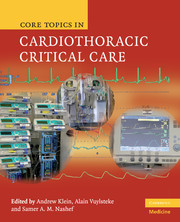Book contents
- Frontmatter
- Contents
- Contributors
- Preface
- Foreword
- Abbreviations
- SECTION 1 Admission to Critical Care
- SECTION 2 General Considerations in Cardiothoracic Critical Care
- SECTION 3 System Management in Cardiothoracic Critical Care
- SECTION 4 Procedure-Specific Care in Cardiothoracic Critical Care
- SECTION 5 Discharge and Follow-up From Cardiothoracic Critical Care
- SECTION 6 Structure and Organisation in Cardiothoracic Critical Care
- 62 Cardiothoracic critical care nursing
- 63 Physiotherapy
- 64 Clinical pharmacy
- 65 Evidence-based design of the cardiothoracic critical care
- 66 Clinical information systems
- 67 Resource management
- 68 Education and training in cardiothoracic critical care in the United Kingdom
- SECTION 7 Ethics, Legal Issues and Research in Cardiothoracic Critical Care
- Appendix Works Cited
- Index
64 - Clinical pharmacy
from SECTION 6 - Structure and Organisation in Cardiothoracic Critical Care
Published online by Cambridge University Press: 05 July 2014
- Frontmatter
- Contents
- Contributors
- Preface
- Foreword
- Abbreviations
- SECTION 1 Admission to Critical Care
- SECTION 2 General Considerations in Cardiothoracic Critical Care
- SECTION 3 System Management in Cardiothoracic Critical Care
- SECTION 4 Procedure-Specific Care in Cardiothoracic Critical Care
- SECTION 5 Discharge and Follow-up From Cardiothoracic Critical Care
- SECTION 6 Structure and Organisation in Cardiothoracic Critical Care
- 62 Cardiothoracic critical care nursing
- 63 Physiotherapy
- 64 Clinical pharmacy
- 65 Evidence-based design of the cardiothoracic critical care
- 66 Clinical information systems
- 67 Resource management
- 68 Education and training in cardiothoracic critical care in the United Kingdom
- SECTION 7 Ethics, Legal Issues and Research in Cardiothoracic Critical Care
- Appendix Works Cited
- Index
Summary
Introduction
The critical care pharmacist, as part of the multidisciplinary team, may initiate, monitor, evaluate and individualize pharmacotherapy for each patient. The traditional role of supplying medications, although still fundamentally important, is now only a small part of the pharmacist's contribution to the patient's care. The pharmacist is responsible for confirming whether the patient is getting the right drug, at the correct dose, by the appropriate route and at the right time. Drug interactions should be identified and drug doses adjusted according to kidney or liver function. A thorough knowledge of changes that can occur in drug handling and the use of therapeutic drug monitoring is also essential.
In a climate of rising health costs, the evaluation of cost effectiveness of treatments must be assessed, as should medication usage through drug utilization evaluation. The pharmacist provides up-to-date medicines information and education to all health professionals. Their role in developing procedures and policies encourages the safe use of medicines, helping to prevent medication errors.
Routine care
After elective cardiac or thoracic surgery, patients are expected to have a routine recovery. The pharmacist's role is to check that standard postoperative medications are prescribed and the patient's regular medications are correctly charted. The expected transitory postoperative renal impairment requires the temporary withholding of medications that impact on renal function.
- Type
- Chapter
- Information
- Core Topics in Cardiothoracic Critical Care , pp. 463 - 467Publisher: Cambridge University PressPrint publication year: 2008

